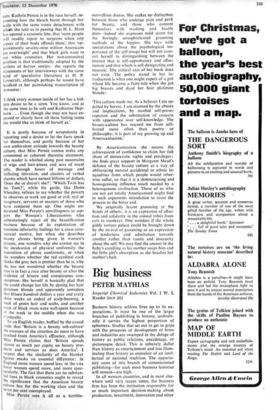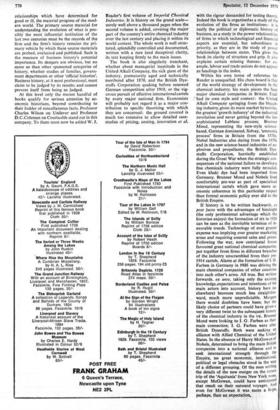Big business
PETER MATHIAS
Imperial Chemical Industries Vol. I W. I, Reader (out, £6) Business history seldom lives up to its ex- pectations. It must be one of the larger branches of publishing in history-, undoubt- edly it carries the highest proportion of ephemera. Studies that set out to get to grips with the processes of development of firms and industries are swamped in the deluge of history as public relations, anecdotage, or picturesque detail. This is infinitely duller than history as entertainment and less illum- inating than history as expositor of an intel- lectual or national tradition. The opportu- nity costs of this branch of commissioned publishing—for such most business histories will remain—are high.
In all western countries, and in most else- where until very recent times, the business firm has been the institution responsible for so much important decision-making about production, investment, innovation and other
relationships which have determined for good or ill, the material progress of the mod- ern world. The primary source material for understanding the evolution of what is pos- sibly the most influential institution of the last two centuries must be the records of the firm and the firm's history remains the pri- mary vehicle by which these source materials are probed, evaluated and published. Such is the measure of business history's potential importance. Its dangers are obvious, but no more so than other sponsored categories of history, whether studies of families, govern- ment departments or other 'official histories'. Business history, at it most professional, must claim to be judged by its results; and cannot prevent itself from being so judged.
At this level only the merest handful of books qualify for serious attention by ec- onomic historians, beyond contributing to their fodder of miscellaneous facts. Professor Charles Wilson on Unilever and Professor D. C. Coleman on Courtaulds stand out in this company. To them must now be added W. J.
Reader's first volume of Imperial Chemical Industries. It is history on the grand scale— surely well above a thousand pages when the second volume is added, covering the major part of the country's entire chemical industry over the last century and placing it within its world context. The whole work is well struc- tured, splendidly controlled and documented, written with a rare (and deceptive) clarity, its text keeping firmly to the main issues.
The book is also singularly trenchant, whether about managerial ineptitude in the United Alkali Company, the sick giant of the industry, prematurely aged and technically moribund after 1870, and the British Dye- stuffs Corporation quaking before renewed German competition after 1918, or the vig- orous pursuit of effective international cartels by every major national firm. Economists will probably not regard it as a major con- tribution to specific theorising with which they are concerned: the ground covered is much too extensive to allow detailed case- studies of pricing, costing, innovation et al. with the rigour demanded for testing theory. Indeed the book is organised as a study of the evolution of the firms as institutions: it is really the political or diplomatic history of business, as a study in the power relationships of firms to which technological and financial aspects are essential, but subordinate in priority, as they are in the study of power
relationships between states. This gives the book its clarity of structure and grip. It also explains certain missing themes: for ex- ample, labour and trade unions do not appear as headings in the index.
Within his own terms of reference Mr Reader is unequalled. His chess board is that of the world strategy of development in the chemical industry; his main pieces the four major chemical companies in Britain. Each had its own style and context : the United Alkali Company springing from the bleach- ing industry, given its main market bytextiles, the greatest 'growth industry' of the industrial revolution and never getting beyond the less
sophisticated Leblanc process; Brunner MOnd, representing the new-style science- based, German dominated, Solvay, 'ammonia process' firms in Britain from the 1870s; Nobel Industries also dating from the 1870s and in the new science-based industries of ex- plosives and propellants; the British Dye. stuffs Corporation, hurriedly established during the Great War when the strategic con- sequences of the national failure to develop a fine chemicals industry were fully revealed. Even khaki dye had been imported from Germany. Brunner Mond and Nobels lived comfortably pre-war as part of specialised international cartels which gave more ec- onomic coherence in this particular respect than formal economic policy ever did to the British Empire.
If history is to be written backwards, ex post facto with the advantages of hindsight (the only professional advantage which the historian enjoys) the formation of ICI in 1926 can be seen as the inevitable terminus of in. exorable trends. Technology of ever greater expense was implying ever greater marketing areas and requiring assured sales and prices. Following the war, new centripetal forces favoured great national chemical companies. put together from firms in different branches of the industry unscrambled from their pre- 1914 cartels. Alarm at the formation of I. G. Farben in Germany in 1943 was driving the main chemical companies of other countries into each other's arms. All true. But written forwards. ex ante, taking only the existing knowledge, expectations and intentions of the main actors into account, history here (as elsewhere) becomes much less straightfor- ward, much more unpredictable. Mergers there would doubtless have been; but the likely choice of partners could have given a very different twist to the subsequent history of the chemical industry in the UK. Brunner Mond were looking to I. G. Farben as their main connection; I. G. Farben were after British Dyestuffs. Both were seeking an alliance with Allied Chemical of the United States. In the absence of Harry McGowan of Nobels, determined to bring the main British companies into a national alliance and to seek international strength through the Empire, no great economic, institutional, political or legal obstacles stood in the way of a different grouping. Of the men settling the details of the new merger on the return trip of the 'Aquitania' from New York none, except McGowan, could have anticipated that result on their outward voyages. And even for McGowan it was more a hope.
perhaps, than an expectation,











































 Previous page
Previous page